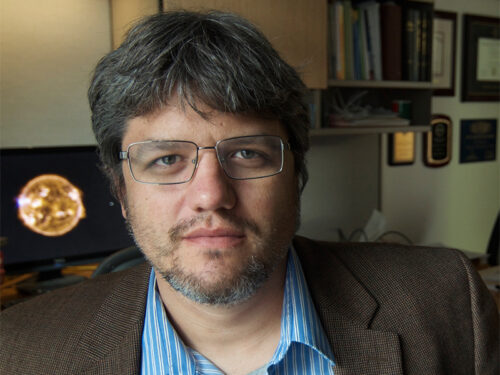
Date: December 5, 2024
Time: 12:30 p.m. - 1:30 p.m.
Location: Maeder Hall Auditorium
Highlight Seminar: An Introduction to Programmable Catalysis for Chemical Energy Technology
Paul Dauenhauer
Distinguished McKnight University Professor, University of Minnesota
Abstract
Economic viability of wind and solar power in the last decade absent concomitant energy storage has left the world with a half-solved problem of sustainable energy integration. The major chemical reactions important for converting electrical power to chemical energy remain slow or unselective using expensive catalysts, including the electrolysis of water for H2, the synthesis of ammonia, or the conversion of CO2 to chemicals. To address this, a new class of programmable catalytic materials have been created that oscillate in electronic state at the natural frequencies of elementary reactions and catalytic cycles using external perturbation (i.e., a program). By manipulating the charge of the active site for chemistry, it becomes possible to dynamically change the chemical energy landscape, leading to faster and more controllable reactions. Surface electronic oscillations in devices such as a ‘catalytic condenser’ can accelerate reactions at resonance conditions leading to thousand-fold rate enhancement, even beyond the Sabatier catalytic rate limit. Experimental and computational results are presented to introduce the concepts of programmable chemistry, the design of experimental catalytic devices, and the principles associated with this emerging field of chemistry.
Bio
Paul Dauenhauer is a Distinguished McKnight University Professor at the University of Minnesota and the Zsolt Rumy Innovation Chair and MacArthur Fellow in the Department of Chemical Engineering and Materials Science. He is the Director of the Center for Programmable Energy Catalysis, a U.S. Department of Energy, Energy Frontier Research Center. His work has been highlighted with the NSF CAREER award, the DOE Early Career Award, the Camille Dreyfus Teacher-Scholar award, and the AIChE CRE Young Investigator award. He has co-founded three companies, and his patents serve as the scientific foundation of five startup companies including Sironix Renewables, Lakril Technologies, Carba, Activated Research Company, and enVerde, LLC.
All seminars are held from 12:30 p.m. to 1:30 p.m.
Lunch is provided at 12:00 noon.
Visit acee.princeton.edu/highlight-seminar-series for more info.